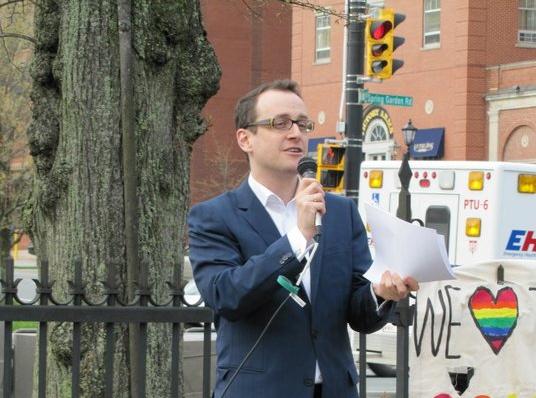Kevin Kindred arrives at our interview straight from work. With his rectangular glasses and strong jaw line, he looks almost intimidating. Luckily, that dissipates the second he says hello. He’s soon shifting his mug on the table, gesticulating gently as he talks about the city he calls home.
“I hate calling Halifax a small town,” he says.
The lawyer-by-day, queer-rights-activist by night has clearly built a relationship with this place. After finishing his law degree in St John’s, the born New Brunswickan migrated to the Nova Scotia capital because he didn’t want to leave the Maritimes.
He seems glad he did. “The community is big enough to get stuff done but not so big to collapse in on itself,” he explains. Kindred says it’s a dynamic he appreciates. “That’s not to say we don’t have radical people in Halifax,” he says. [But it’s] harder just to hide in the echo chamber of LGBT activism, the kind of navel gazing and self-congratulatory attitude when you get 500 activists in a room.”
Now, he’s a major influence in the legal discussions that affect Nova Scotians through his work with the Nova Scotia Rainbow Action Project (NSRAP).
In 2007, for example, Kindred acted as counsel to Jamie and Emily O’Neill, lesbian mothers who filed a human rights complaint against Nova Scotia’s then-heteronormative birth registration process. That year, Nova Scotia amended its Vital Statistics Act to recognize both members of a same-sex couple as “parents” on their child’s birth certificate.
The passion that has led him to break legal boundaries leads NSRAP chair Matthew Numer to describe Kindred as a key player in provincial political battles. “Kevin is extremely well spoken,” Numer says. “I’ve never seen Kevin get mad, lose it, anything like that . . . I can’t say I’ve ever seen Kevin lose his grace, so to speak.”
But the same guy who never loses his grace has an almost bubbly energy. Get him talking about political stuff, and he moves sharply but quickly from broader theory to proactive community building to the place of legal battles in the queer movement.
“It’s not necessarily the future of activism,” he says. He points to social, systemic issues, like homophobia in schools and senior citizens’ centres. “We’ve defined ourselves as a law reform movement for so long that we have to understand, when we scratch everything off that list, there’s still going to be a whole lot of stuff for us to do,” he says. “How do we become a movement that does that stuff?”
That’s not to say there are no more legal issues to take on in Nova Scotia. Kindred and NSRAP have just begun to focus on lobbying the province – the first ever NDP government in Nova Scotia – to have gender identity included in the Nova Scotia Human Rights Act.
“We’ve had some meetings with the right people in government about it,” he says, pointing to Nova Scotia’s minister of justice, Ross Landry. “There’s a willingness to tackle the question.”
Kindred says the issue seems to be not one of support, but of process and timing. “The questions [are] when is the right time to introduce something like that in the legislature, and what kind of background materials we need to get to them,” he explains.
The government communications bureaus in Nova Scotia are comically opaque. But there have been positive meetings with NSRAP this year. “The minister looks forward to more dialogue with this group and the broader community on these important issues,” says Ross McLaren, communications director for the justice department.
It’s a new space for Kindred to work as an activist, one that he’s found refreshing.
“I’ve never been part of the movement at a time when you needed to explain to people that sexual orientation wasn’t a disease or gay people aren’t all sexual perverts,” he explains. “Those kinds of stereotypes . . . they never went away. But people in polite company weren’t willing to come up to me in polite company and say, ‘Prove to me that you’re not a sexual deviant.’
“Not that I’m not a sexual deviant,” he jokes, before becoming more serious.
“The trade-off of [discussions around] gender identity being relatively new is that . . . you can have real conversations about it.”
The struggles Kindred identifies for the movement in Nova Scotia might be different from the ones activists from “the centre of the Earth” expect. The first one he points out is city-dweller snobbery.
“I do sometimes encounter, working on issues that have national scope, some lack of understanding of the kind of sophistication of the ability of activists outside of Toronto,” he notes. “During the same-sex marriage movement, there was a bit of tension . . . ‘Do we trust the activists outside of Ontario to go to court with their cases? Will they competently argue the issue?’”
Kindred also craves more national support so municipalities outside of Toronto can support and learn from one another.
“We still, in Canada, lack a really good nationwide network of activists,” he says. “There aren’t a lot of forums where activists from across the country get together and strategize and talk about each other’s plans.”
Fellow activist Numer says he relies on Kindred’s candour to cut through some of what he calls the “Maritime style of talking about things behind closed doors.
“I think we’ve made a lot of progress in recent years, and I think we still have a lot more challenges to overcome,” Numer says. “And I don’t think it just gets better. It takes the work of dedicated, committed people like Kevin to make these changes . . . so people can feel free to live openly.”


 Why you can trust Xtra
Why you can trust Xtra


